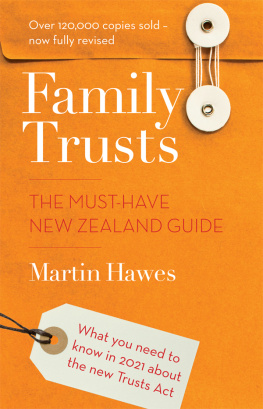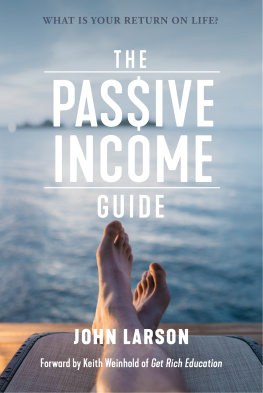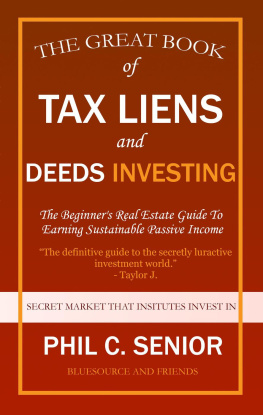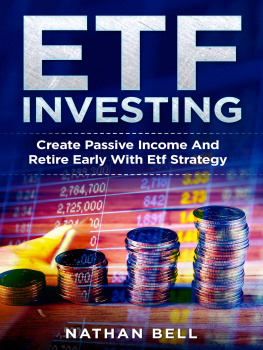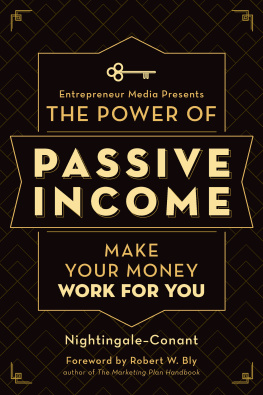INVESTING FOR
TWENTY GOOD
SUMMERS
INVESTING FOR
TWENTY GOOD
SUMMERS
Making your money work
so you dont have to
MARTIN HAWES

First published in 2009
Copyright Martin Hawes 2009
All rights reserved. No part of this book may be reproduced or
transmitted in any form or by any means, electronic or mechanical,
including photocopying, recording or by any information storage
and retrieval system, without prior permission in writing from
the publisher. The Australian Copyright Act 1968 (the Act) allows
a maximum of one chapter or 10 per cent of this book, whichever
is the greater, to be photocopied by any educational institution for
its educational purposes provided that the educational institution
(or body that administers it) has given a remuneration notice to
Copyright Agency Limited (CAL) under the Act.
Allen & Unwin
83 Alexander Street
Crows Nest NSW 2065
Australia
Phone: (61 2) 8425 0100
Fax: (61 2) 9906 2218
Email: info@allenandunwin.com
Web: www.allenandunwin.com
National Library of Australia
Cataloguing-in-Publication entry:
Hawes, Martin, 1952
Investing for twenty good summers : making your money work
so you dont have to
ISBN 978 1 74175 689 0
1. RetirementPlanning. 2. Retirement incomePlanning.
3. Finance, Personal.
332.024014
Set in 12/15.1 pt Adobe Caslon Pro
Designed and typeset by IslandBridge
Printed in Australia by McPhersons Printing Group
10 9 8 7 6 5 4 3 2 1
Contents
Introduction
Fifteen good summers
All change
Getting ready for some good summers
Managing risk
Asset allocation
Managing risk
Lakes and rivers
Timing
Boom or gloom?
The place of debt assets
Bonds and deposits
The place of ownership assets
Shares and property
Introduction
Fifteen good summers
Now I am down to fifteen good summers.
When I wrote Twenty Good Summerswork less, live moreand make the most of your money, I was 52 years old. Now I am 55: more summers have ticked by. They dont seem to go by any slower, in fact, quite the opposite. If twenty summers seemed a small, finite number, fifteen summers is getting positively scary!
I had the idea for Twenty Good Summers on my fiftieth birthday. I spent that day ice-climbingclimbing frozen waterfalls in the Remarkables range near my home in Queenstown. When I got to the summit that day, I did what I have done nearly every time I have reached the summit of a mountain in the area: I looked out at the sea of mountains which make up New Zealands Southern Alps and contemplated all of the climbs that I must do one day. However, as I was doing this, a thought occurred to me: I probably would not be doing this sort of climbing when I was 70and today was my fiftieth birthday. Therefore I only had 20 good summers to do the climbs that I wanted.
This gave me a frighttwenty is a relatively small (and certainly finite) number. No longer does life stretch out ahead into the never-never. Whatever climbs I wanted to do, I had better get on and do them!
Since Twenty Good Summers was published, I have dealt with many clients who have wanted to rearrange their money so that they could work less and get on with living the lives that they want to live. To do this requires a whole new attitude and a whole new way of managing and investing moneyboth of which make up the theme and content of this book. It is a time for changesunfortunately coming at a time of life when change no longer comes as easily as it once did. Nevertheless, if you want to change your life and have more time to do things, you are going to have to change your approach to money and investment. The key point is that you have to make the right changesthis is no time to make a major investment mistake.
Baby boomers are redefining retirement. We are staring into the face of the end of full-time work and starting to think about how we will have to rearrange our money. We know that we will have to become reliant on investment returns for at least some of our income and some of us are not sure about how this will work. While I use the word often enough, I dont really like the idea of retirement. To me, the word retirement has connotations of living a poor life, being hunched over a one-bar heater and reusing tea bags while you wait (usually in vain) for a visit from one of your children or grandchildren.
Retirement says to me that people have withdrawn from society; that they are no longer defined by what they do. One client said to me that before retirement she would tell people at social gatherings that she was an employment lawyer. People were interested in this and engaged in conversation. After she finished working, however, she would tell people that she was retired and she could see their eyes dart around the room looking for someone more interesting to talk to.
A better option for many is not to stop work but to slow down, to ease back into a comfortable semi-retirement where you still have some income from work and interest on investments, but also have more time to do the things that you have long promised yourself you would do one day.
Virtually all of the clients I have seen in the last few years have not wanted to retire but instead to work less and ease back. As baby boomers we tend to see our latter years as a time when we can be actively engaged in our sports and hobbies, but also in work to some extentpossibly in voluntary work. Continuing in paid work is partly about earning additional income but partly about continuing to contribute to society. It can also be about giving our days some shape and structure. Many people now have a completely different idea of retirement than their parents would have had.
Once you retire, you may want to work to some extent, but this work will probably not provide you with all of the income that you will need. Many people have to supplement the income that they receive from working less with income derived from their investment capital. This is, after all, exactly what the investment capital has been accumulated for: it is wealth you have built up for retirement and now is the time to start to use that wealth for the income that you need. This calls for a change to your investment strategyyou should no longer be aiming to build up wealth but instead your strategy should be about using your wealth to derive income.
Becoming reliant on income from investments is scary.
Anyone who can read a newspaper knows that investment returns are volatile, that they will not give the steady and regular income that is needed to fund living expenses. The losses that investors sometimes take are realit is no fun to contemplate a diminished retirement fund when that is the only investment that you have.
If you are looking at investing for your retirement, you are likely to be a risk-averse investor. Much of this book is about reducing investment risk in its various forms. This book aims to give you some ideas to help you reduce the volatility of your investment portfolio and to structure your finances so that the returns that you receive are steady and smooth (or as steady and smooth as they can be). When you start to invest for twenty good summers, your aims will be different from when you were investing to build up a retirement nest egg. Because your aims are different, your investment strategy will also be different. This different strategy, aimed at steady and smooth income returns, is not talked about much in the media. The types of investments that you make and the way that you structure those investments is important. They will dictate whether you have good summers when you can ease your way into some kind of retirement or some tough summers where money is tight. Your investment approach has the potential to give you some years of great joy or of misery. There is little scope when investing later in life to make up for serious investment mistakesthis is something that you have to get right first time.
Next page

